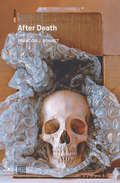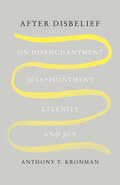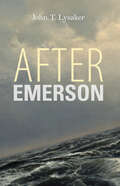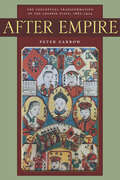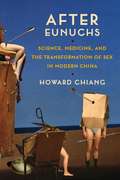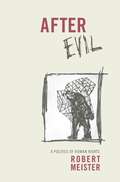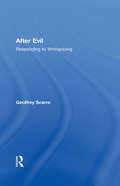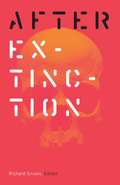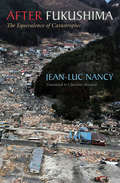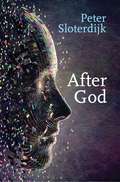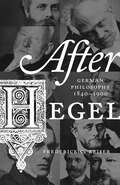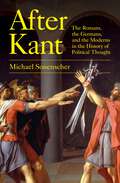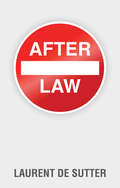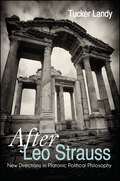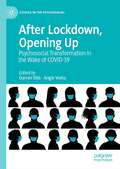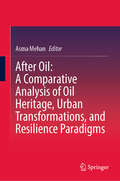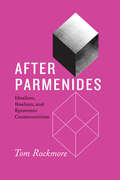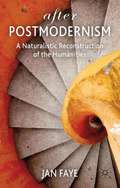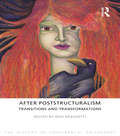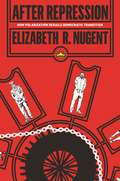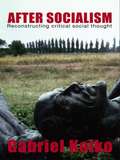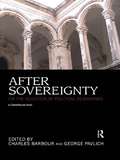- Table View
- List View
After Death
by Francois J. BonnetA disturbing portrait of a society deliriously dreaming itself as eternal, instantaneous, and infinite. At least for the time being, we humans are still finite and mortal—but death isn't what it used to be. As the body is technologically extended in space and time, we are split between our finitude and our doubled presence in a limitless web of signs, an “immortal” world of information. After Death offers a penetrating philosophical diagnosis of our contemporary condition, describing not only an anesthesia, but an amnesia in which the compulsions of a hyper-present colonize both past and future, prevailing over any sense of duration, becoming, or appreciation of the “thickness of the real.” Are we living in a kind of counterfeit eternity in which we are effectively already dead? Against the anxiety of the constant present, how can we hope to return to the experience of being in time and facing death? After Death is a disturbing portrait of a society deliriously dreaming itself as eternal, instantaneous, and infinite.
After Disbelief: On Disenchantment, Disappointment, Eternity, and Joy
by Anthony T. KronmanAn intimate, philosophic quest for eternity, amidst the disenchantments and disappointments of our time &“Aims to persuade America&’s &‘relentlessly rational&’ elites to acknowledge the existence of &‘divinity.&’ . . . Kronman&’s ambition is to repair &‘the schism between those for whom religion continues to matter and those who view it with amusement or contempt.&’&”—Tunku Varadarajan, Wall Street Journal &“In this deceptively quiet and self-effacing book, Anthony Kronman makes an audacious argument: the most important things in our lives make sense only if we believe the world is divine. In a sense, we already believe it, if only we could find the words. Here they are.&”—Jedediah Britton-Purdy, author of After Nature: A Politics for the Anthropocene Many people of faith believe the meaning of life depends on our connection to an eternal order of some kind. Atheists deride this belief as a childish superstition. In this wise and profound book, Anthony Kronman offers an alternative to these two entrenched positions, arguing that neither addresses the complexities of the human condition. We can never reach God, as religion promises, but cannot give up the longing to do so either. We are condemned by our nature to set goals we can neither abandon nor fulfill, yet paradoxically are able to approach more closely if we try. The human condition is one of inevitable disappointment tempered by moments of joy. Resolutely humanistic and theologically inspired, this moving book offers a rational path to the love of God amidst the disenchantments of our time.
After Emerson (American Philosophy)
by John T. LysakerThe author of Emerson & Self-Culture shares essays covering such themes as identity, experience, ethics, poetry, philosophy, history, and race.John T. Lysaker works between and weaves together questions and replies in philosophical psychology, Emerson studies, and ethics in this book of deep existential questioning. Each essay in this atypical, philosophical book employs recurring terms, phrases, and questions that characterize our contemporary age. Setting out from the idea of where we are in an almost literal sense, Lysaker takes readers on an intellectual journey into thematic concerns and commitments of broad interest, such as the nature of self and self-experience, ethical life, poetry and philosophy, and history and race. In the manner of Emerson, Cavell, and Rorty, Lysaker’s vibrant writing is certain to have a transformative effect on American philosophy today.“An original and stimulating book, manifesting a level of reflection and existential concern of the highest order. It is intellectually and personally honest.” —Robert E. Innis, author of Susanne Langer in Focus“There is something fresh and hence refreshing in the manner in which John T. Lysaker takes up familiar topics. He shows, with both arresting details and an evolving design, how the conduct of life (to use Emerson’s expression) demands a form of thought frequently at odds with contemporary fashions and preoccupations, with institutionally entrenched approaches and all too rigidly policed discourses.” —Vincent Colapietro, author of Experience, Interpretation, and Community“Acknowledged as one of his generations premier Emerson scholars, Lysaker goes beyond his earlier work, Emerson & Self-Culture . . . [T]he writing is stimulating, vibrant, challenging, risky, and fecund. Recommended.” —D. B. Boersma, Choice
After Empire: The Conceptual Transformation of the Chinese State, 1885-1924
by Peter ZarrowFrom 1885-1924, China underwent a period of acute political struggle and cultural change, brought on by a radical change in thought: after over 2,000 years of monarchical rule, the Chinese people stopped believing in the emperor. These forty years saw the collapse of Confucian political orthodoxy and the struggle among competing definitions of modern citizenship and the state. What made it possible to suddenly imagine a world without the emperor? After Empiretraces the formation of the modern Chinese idea of the state through the radical reform programs of the late Qing (1885-1911), the Revolution of 1911, and the first years of the Republic through the final expulsion of the last emperor of the Qing from the Forbidden City in 1924. It contributes to longstanding debates on modern Chinese nationalism by highlighting the evolving ideas of major political thinkers and the views reflected in the general political culture. Zarrow uses a wide range of sources to show how "statism" became a hegemonic discourse that continues to shape China today. Essential to this process were the notions of citizenship and sovereignty, which were consciously adopted and modified from Western discourses on legal theory and international state practices on the basis of Chinese needs and understandings. This text provides fresh interpretations and keen insights into China's pivotal transition from dynasty to republic.
After Eunuchs: Science, Medicine, and the Transformation of Sex in Modern China
by Howard ChiangFor much of Chinese history, the eunuch stood out as an exceptional figure at the margins of gender categories. Amid the disintegration of the Qing Empire, men and women in China began to understand their differences in the language of modern science. In After Eunuchs, Howard Chiang traces the genealogy of sexual knowledge from the demise of eunuchism to the emergence of transsexuality, showing the centrality of new epistemic structures to the formation of Chinese modernity.From anticastration discourses in the late Qing era to sex-reassignment surgeries in Taiwan in the 1950s and queer movements in the 1980s and 1990s, After Eunuchs explores the ways the introduction of Western biomedical sciences transformed normative meanings of gender, sexuality, and the body in China. Chiang investigates how competing definitions of sex circulated in science, medicine, vernacular culture, and the periodical press, bringing to light a rich and vibrant discourse of sex change in the first half of the twentieth century. He focuses on the stories of gender and sexual minorities as well as a large supporting cast of doctors, scientists, philosophers, educators, reformers, journalists, and tabloid writers, as they debated the questions of political sovereignty, national belonging, cultural authenticity, scientific modernity, human difference, and the power and authority of truths about sex. Theoretically sophisticated and far-reaching, After Eunuchs is an innovative contribution to the history and philosophy of science and queer and Sinophone studies.
After Evil: A Politics of Human Rights (Columbia Studies In Political Thought/political History)
by Robert MeisterThe way in which mainstream human rights discourse speaks of such evils as the Holocaust, slavery, or apartheid puts them solidly in the past. Its elaborate techniques of "transitional" justice encourage future generations to move forward by creating a false assumption of closure, enabling those who are guilty to elude responsibility. This approach to history, common to late-twentieth-century humanitarianism, doesn't presuppose that evil ends when justice begins. Rather, it assumes that a time before justice is the moment to put evil in the past. Merging examples from literature and history, Robert Meister confronts the problem of closure and the resolution of historical injustice. He boldly challenges the empty moral logic of "never again" or the theoretical reduction of evil to a cycle of violence and counterviolence, broken only once evil is remembered for what it was. Meister criticizes such methods for their deferral of justice and susceptibility to exploitation and elaborates the flawed moral logic of "never again" in relation to Auschwitz and its evolution into a twenty-first-century doctrine of the Responsibility to Protect.
After Evil: Responding to Wrongdoing
by Geoffrey ScarreEvils, both large and small, are a constant feature of human life. This book is about responding to them and in particular about responding to moral evils, that is, those produced by the deliberate acts of human beings. Prominent in our repertoire of responses to moral evil are forgiveness and punishment, and these, with the numerous conceptual and moral problems they raise, are at the heart of the study in this book. After discussing the idea of evil, Scarre turns to the meaning of forgiveness and the conditions for granting it. He defends a broadly utilitarian approach that stresses the role of forgiveness in repairing the damage that has been caused by injurious or offensive behaviour. Scarre then considers the controversial virtue of mercy and the propriety of revengeful behaviour and resentful attitudes. Finally, he deals with the purpose and justification of judicial punishment, paying particular regard to the appropriate treatment of war criminals. In this timely and sensitively written book, Scarre pays close attention to the existing literature and appraises both contemporary and classical contributions to the debate. This book makes an original contribution to an area of ethical thought that has been attracting an increasing amount of attention from philosophers, jurists and political thinkers.
After Extinction (21st Century Studies #6)
by Ashley Dawson Joseph Masco William E. Connolly Jussi Parikka Cary Wolfe Nicholas Mirzoeff Margaret Noodin Bernard C. Perley Claire Colebrook Joanna Zylinska Daryl BaldwinA multidisciplinary exploration of extinction and what comes next What comes after extinction? Including both prominent and unusual voices in current debates around the Anthropocene, this collection asks authors from diverse backgrounds to address this question. After Extinction looks at the future of humans and nonhumans, exploring how the scale of risk posed by extinction has changed in light of the accelerated networks of the twenty-first century. The collection considers extinction as a cultural, artistic, and media event as well as a biological one. The authors treat extinction in relation to a variety of topics, including disability, human exceptionalism, science-fiction understandings of time and posthistory, photography, the contemporary ecological crisis, the California Condor, systemic racism, Native American traditions, and capitalism.From discussions of the anticipated sixth extinction to the status of writing, theory, and philosophy after extinction, the contributions of this volume are insightful and innovative, timely and thought provoking. Contributors: Daryl Baldwin, Miami U; Claire Colebrook, Pennsylvania State U; William E. Connolly, Johns Hopkins U; Ashley Dawson, CUNY Graduate Center; Joseph Masco, U of Chicago; Nicholas Mirzoeff, New York U; Margaret Noodin, U of Wisconsin–Milwaukee; Jussi Parikka, U of Southampton; Bernard C. Perley, U of Wisconsin–Milwaukee; Cary Wolfe, Rice U; Joanna Zylinska, Goldsmiths, U of London.
After Fukushima: The Equivalence of Catastrophes
by Jean-Luc NancyThe renowned philosopher offers &“a powerful reflection on our times . . . and the fate of our civilization, as revealed by the catastrophe of Fukushima&” (François Raffoul, Louisiana State University). In 2011, a tsunami flooded Japan&’s Fukushima Daiichi Nuclear Power Plant, causing three nuclear meltdowns, the effects of which will spread through generations and have an impact on all living things. In After Fukushima, philosopher Jean-Luc Nancy examines the nature of catastrophes in the era of globalization and technology. He argues that in today&’s interconnected world, the effects of any disaster will spread in the way we currently associate only with nuclear risk. Can a catastrophe be an isolated occurrence? Is there such a thing as a &“natural&” catastrophe when all of our technologies—nuclear energy, power supply, water supply—are necessarily implicated, drawing together the biological, social, economic, and political? In this provocative and engaging work, Nancy examines these questions and more. Exclusive to this English edition are two interviews with Nancy conducted by Danielle Cohen-Levinas and Yuji Nishiyama and Yotetsu Tonaki.
After God
by Peter SloterdijkIn his Critique of Cynical Reason, Peter Sloterdijk pursued an enlightenment of the Enlightenment in both its beginnings and the present. After God is dedicated to the theological enlightenment of theology. It ranges from the period when gods reigned, through the rule of the world-creator god to reveries about the godlike power of artificial intelligence. The path of this self-enlightening theology, which is carried out here by a non-theologian, must begin well before Nietzsche’s declaration of the death of God, and it must move beyond this dictum to explore the present and the future. Since the early 20th century we have seen how the metaphysical twilight of the gods, which has preoccupied philosophers and theologians, has been accompanied by an earthly twilight of the souls. The emergence of psychoanalysis, and more recently the development of the neuro-cognitive sciences, have secularized the old Indo-European concept of the soul and transferred many accomplishments of the human mind to computerized machines. What remains of the eternal light of the soul after the artificial lights have been turned on? Have the inventors of AI thrust themselves into the position vacated by the death of god? Perhaps the distinction between God and idols will soon re-emerge here for the citizens of modernity, only this time in a technological and political register. For them, theological enlightenment – which is completely different from an instinctive rejection of religion – will be a fateful task. This new work by one of the most original thinkers today will appeal to students and scholars across the humanities and social sciences, as well as anyone interested in religion, philosophy and critical theory today.
After Hegel: German Philosophy, 1840–1900
by Frederick C. BeiserHistories of German philosophy in the nineteenth century typically focus on its first half—when Hegel, idealism, and Romanticism dominated. By contrast, the remainder of the century, after Hegel's death, has been relatively neglected because it has been seen as a period of stagnation and decline. But Frederick Beiser argues that the second half of the century was in fact one of the most revolutionary periods in modern philosophy because the nature of philosophy itself was up for grabs and the very absence of certainty led to creativity and the start of a new era. In this innovative concise history of German philosophy from 1840 to 1900, Beiser focuses not on themes or individual thinkers but rather on the period’s five great debates: the identity crisis of philosophy, the materialism controversy, the methods and limits of history, the pessimism controversy, and the Ignorabimusstreit. Schopenhauer and Wilhelm Dilthey play important roles in these controversies but so do many neglected figures, including Ludwig Büchner, Eugen Dühring, Eduard von Hartmann, Julius Fraunstaedt, Hermann Lotze, Adolf Trendelenburg, and two women, Agnes Taubert and Olga Pluemacher, who have been completely forgotten in histories of philosophy. The result is a wide-ranging, original, and surprising new account of German philosophy in the critical period between Hegel and the twentieth century.
After Ideology: Recovering the Spiritual Foundations of Freedom
by David Walsh<p>The crises of the twentieth century - wars, genocide, the proliferation of atomic weapons, the rise and fall of communism, the breakup of the family - have shaken our faith in modernity and in the fundamental conceit upon which it is grounded: that human beings are capable of providing their own moral and political order. Ideologies based on this conceit have at their heart the revolt against God that has so characterized modern history, and these ideologies have failed us. <p>Walsh contends that the solution is to recover the spiritual foundations of freedom and order. To make his case, he draws lessons from the intellectual pilgrimages of four contemporary thinkers who overcame the modern spirit of revolt against God: Dostoevsky, Solzhenitsyn, Camus, and Voegelin. He shows how each confronted the full consequences of secular messianism and found within his own experience the means of overcoming it. In the process of mounting a critique of modernity and articulating the direction in which the alternative lies, the four recovered what is in essence philosophic Christianity. They show us that beyond nihilism, beyond the revolt against God, there is the existential rediscovery of transcendent truth. <p>Walsh believes liberal democracy is redeemable, but that its redemption hinges on our return to a proper understanding of human nature and to a spiritual foundation based on Christian principles. We must first recognize, however, that without God, without moral absolutes, without divine order, we can not resolve our worldwide modern crisis.</p>
After Kant: The Romans, the Germans, and the Moderns in the History of Political Thought
by Michael SonenscherTracing the origins of modern political thought through three sets of arguments over history, morality, and freedomIn this wide-ranging work, Michael Sonenscher traces the origins of modern political thought and ideologies to a question, raised by Immanuel Kant, about what is involved in comparing individual human lives to the whole of human history. How can we compare them, or understand the results of the comparison? Kant’s question injected a new, future-oriented dimension into existing discussions of prevailing norms, challenging their orientation toward the past. This reversal made Kant’s question a bridge between three successive sets of arguments: between the supporters of the ancients and moderns, the classics and romantics, and the Romans and the Germans. Sonenscher argues that the genealogy of modern political ideologies—from liberalism to nationalism to communism—can be connected to the resulting discussions of time, history, and values, mainly in France but also in Germany, Switzerland, and Britain, in the period straddling the French and Industrial revolutions.What is the genuinely human content of human history? Everything begins somewhere—democracy with the Greeks, or the idea of a res publica with the Romans—but these local arrangements have become vectors of values that are, apparently, universal. The intellectual upheaval that Sonenscher describes involved a struggle to close the gap, highlighted by Kant, between individual lives and human history. After Kant is an examination of that struggle’s enduring impact on the history and the historiography of political thought.
After Law
by Laurent de SutterLaw is the most sacred fetish of our time. From radicals to conservatives, there is no militant, activist or thinker who would consider doing without it. But the history of our fascination with law is long and complex, and reaches deeper into our culture than we might think. In After Law, Laurent de Sutter takes us on a journey to uncover the sources of our fascination. He shows that at a certain moment in our history a choice was made to treat law as a decisive feature of civilization, but this choice was neither obvious nor necessary. Other political, social, religious or cultural possibilities could have been chosen instead – from ancient Egypt to Mesopotamia, from medieval Japan to China, from Islam to Judaism, other cultures have devised sophisticated tools to help people live together without having to deal with norms, rules and principles. This is a lesson worth reflecting on, especially at a time when the rule of law and the functioning of justice are increasingly showing their sinister side – and their impotence. Is there life beyond law?
After Leo Strauss: New Directions in Platonic Political Philosophy (SUNY series in the Thought and Legacy of Leo Strauss)
by Tucker LandyFew thinkers of the twentieth century studied the fundamental questions of ethics and politics, or penetrated further into the philosophical sources of the moral relativism of our times, more deeply than Leo Strauss. After Leo Strauss is not yet another attempt to explicate, critique, or defend Strauss. Instead, it encourages us to look in new directions, and to escape certain aspects of Strauss's powerful influence, in order to revisit classic texts and make our own judgments about what those texts might mean. Tucker Landy proposes a post-Straussian reading of the Platonic dialogues that is non-esoteric yet respectful of their subtle dramatic-pedagogic form and urges us, in a spirit of Socratic humility, to reexamine ancient and modern theories of natural right to seek possible grounds for reconciliation between them. Landy puts forth a Socratic theory of democratic liberalism as an example of such reconciliation.
After Lockdown, Opening Up: Psychosocial Transformation in the Wake of COVID-19 (Studies in the Psychosocial)
by Darren Ellis Angie VoelaThis edited volume examines the psychosocial transformations experienced during the COVID-19 pandemic and lockdown, and envisions those that might lead to a more equitable society as we ‘open up’. The book integrates psychoanalysis, sociology, cultural studies, and psychology to address three main areas: personal experiences of the lockdown, new formations of power and desire that the lockdown has shaped, and global concerns related to the pandemic. Within those three areas, the chapters discuss key themes that include the uses of space during lockdown; experiences of death, loss, and domestic violence; race and the pandemic; technology, media, and viral media; chronic illness; handwashing and COVID-19; and conspiracy theories.Drawing together academics and practitioners with a common vision of social justice and active pedagogy, the contents of this volume combine experiential writing with cutting-edge, theoretically-informed interdisciplinary debates. The book advances and demonstrates the productive diversity of psychosocial studies, drawing on psychoanalytic theories, critical psychologies, critical theories, critical race theories, process philosophies, affect theories, and critical pedagogy. In doing so, it will appeal to scholars across the social sciences.
After Nature: A Politics for the Anthropocene
by Jedediah PurdyNature no longer exists apart from humanity. The world we will inhabit is the one we have made. Geologists call this epoch the Anthropocene, Age of Humans. The facts of the Anthropocene are scientific--emissions, pollens, extinctions--but its shape and meaning are questions for politics. Jedediah Purdy develops a politics for this post-natural world.
After Oil : A Comparative Analysis of Oil Heritage, Urban Transformations, and Resilience Paradigms
by Asma MehanThis book offers an academic analysis of the concept of heritage within the realm of oil-related urban development. It focuses on the term 'heritage', with a specific emphasis on 'oil heritage', exploring its varied implications for urban futures. The book provides a nuanced understanding of heritage, discussing its different interpretations and values across cultural and environmental contexts. It examines the legacy of oil, assessing its role and impact on societies. It presents a balanced view, acknowledging both the economic benefits of oil in urban growth and the environmental and socio-economic issues it poses. This approach places oil heritage within a broader heritage context, critically evaluating its unique characteristics. The book also investigates how various cultures perceive and engage with the idea of oil heritage. It highlights the contrast between the political debates over oil in Western countries and the developmental challenges faced by emerging economies, showcasing the global variance in the concept of 'oil heritage'. Additionally, the narrative considers the changing role and meaning of oil over time, reflecting on its historical importance and the challenges it poses for the future, especially in transitioning to a post-oil era. Through its chapters, the book provides a critical examination of the interplay between oil, urban development, and heritage studies. It is designed to contribute to scholarly discourse in these areas, targeting academics, students, policymakers, and professionals interested in the intricate relationship between oil heritage and urban dynamics.
After Parmenides: Idealism, Realism, and Epistemic Constructivism
by Tom RockmoreEngages with one of the oldest philosophical problems—the relationship between thought and being—and offers a fresh perspective with which to approach the long history of this puzzle. In After Parmenides, Tom Rockmore takes us all the way back to the beginning of Western philosophy, when Parmenides asserted that thought and being are the same. This idea created a division between what the mind constructs as knowable entities and the idea that there is also a mind-independent real, which we can know or fail to know. Rockmore argues that we need to give up on the idea of knowing the real as it is, and instead focus on the objects of cognition that our mind constructs. Though we cannot know mind-independent objects as they “really” are, we can and do know objects as they appear to us.After Parmenides charts the continual engagement with these ideas of the real and the knowable throughout philosophical history from Plato and Aristotle to Descartes, Kant, Fichte, Hegel, Schopenhauer, Marx, and others. This ambitious book shows how new connections can be made in the history of philosophy when it is reread through a new lens.
After Physics
by David Z. AlbertHere the philosopher and physicist David Z Albert argues, among other things, that the difference between past and future can be understood as a mechanical phenomenon of nature and that quantum mechanics makes it impossible to present the entirety of what can be said about the world as a narrative of "befores" and "afters."
After Postmodernism
by Jan FayeThe philosophy of the humanistic sciences has been a blind-spot in analytic philosophy. This book argues that by adopting an appropriate pragmatic analysis of explanation and interpretation it is possible to show that scientific practice of humanistic sciences can be understood on similar lines to scientific practice of natural and social sciences.
After Poststructuralism: Transitions and Transformations (The History of Continental Philosophy)
by Rosi BraidottiThe end of the Cold War revitalised continental philosophy and, more particularly, interest in it from outside philosophy. "After Poststructuralism: Transitions and Transformations" analyses the main developments in continental philosophy between 1980-1995, a time of great upheaval and profound social change. The volume ranges across the birth of postmodernism, the differing traditions of France, Germany and Italy, third generation critical theory, radical democracy, postcolonial philosophy, the turn to ethics, feminist philosophies, the increasing engagement with religion, and the rise of performativity and post-analytic philosophy. Analyses of the major figures are integrated within the discussion. After Poststructuralism reveals how continental philosophy - fuelled by an intense ethical and political desire to reflect changing social and political conditions - responded to the changing world and to the key issues of the time, notably globalisation, technology and ethnicity.
After Repression: How Polarization Derails Democratic Transition (Princeton Studies in Political Behavior #24)
by Elizabeth R. NugentHow differing forms of repression shape the outcomes of democratic transitionsIn the wake of the Arab Spring, newly empowered factions in Tunisia and Egypt vowed to work together to establish democracy. In Tunisia, political elites passed a new constitution, held parliamentary elections, and demonstrated the strength of their democracy with a peaceful transfer of power. Yet in Egypt, unity crumbled due to polarization among elites. Presenting a new theory of polarization under authoritarianism, After Repression reveals how polarization and the legacies of repression led to these substantially divergent political outcomes.Drawing on original interviews and a wealth of new historical data, Elizabeth Nugent documents polarization among the opposition in Tunisia and Egypt prior to the Arab Spring, tracing how different kinds of repression influenced the bonds between opposition groups. She demonstrates how widespread repression created shared political identities and decreased polarization—such as in Tunisia—while targeted repression like that carried out against the Muslim Brotherhood in Egypt led opposition groups to build distinct identities that increased polarization among them. This helps explain why elites in Tunisia were able to compromise, cooperate, and continue on the path to democratic consolidation while deeply polarized elites in Egypt contributed to the rapid reentrenchment of authoritarianism.Providing vital new insights into the ways repression shapes polarization, After Repression helps to explain what happened in the turbulent days following the Arab Spring and illuminates the obstacles to democratic transitions around the world.
After Socialism: Reconstructing Critical Social Thought
by Gabriel KolkoDoes socialism have a future in the world of the twenty-first century? If not, what is the future for progressive politics? This is a major contribution to contemporary social and political thought written by one of the world's leading critical historians. Gabriel Kolko ask the difficult questions about where the left can go in a post-Cold War world where neoliberal policies appear to have triumphed in both the West and the former Soviet bloc. In trying to answer this, he interrogates both the origins and development of socialist ideas and the contemporary dynamics of the globalized economy dominated by American military, cultural and political might. While avoiding the temptations of either pessimism or utopianism, Kolko offers an original and practical solution about the way forward for a liberal politics.
After Sovereignty: On the Question of Political Beginnings
by Charles Barbour George PavlichAfter Sovereignty addresses the vexed question of sovereignty in contemporary social, political, and legal theory. The emergence, and now apparent implosion, of international capital exceeding the borders of known political entities, the continued expansion of a potentially endless 'War on Terror', the often predicted, but still uncertain, establishment of either a new international American Empire or a new era of International Law, the proliferation of social and political struggles among stateless refugees, migrant workers, and partial citizens, the resurgence of religion as a dominant source of political identification among people all over the globe – these developments and others have thrown into crisis the modern concept of sovereignty, and the notions of statehood and citizenship that rest upon it. Drawing on classical sources and more contemporary speculations, and developing a range of arguments concerning the possibility of political beginnings in the current moment, the papers collected in After Sovereignty contribute to a renewed interest in the problem of sovereignty in theoretical and political debate. They also provide a multitude of resources for the urgent, if necessarily fractured and diffuse, effort to reconfigure sovereignty today. Whilst it has regularly been suggested that the sovereignty of the nation-state is in crisis, the exact reasons for, and exact implications of, this crisis have rarely been so intensively examined.
